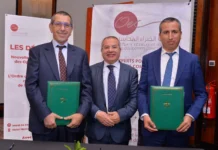
Morocco’s Law 13-21, which came into effect in March 2022, sets the legal framework for the development of medical, cosmetic, and industrial cannabis industries, aligning with the Kingdom’s international commitments. Here are seven key questions to better understand this legislation:
1. What are the main objectives of Law 13-21 on the legal uses of cannabis?
Law 13-21 aims to regulate the cultivation and use of cannabis for medicinal and industrial purposes. It establishes a legal framework for nine authorized activities, including cannabis cultivation, production, nursery creation, seed import/export, and the processing, commercialization, and transport of cannabis and its products. The law also introduces a stringent system for monitoring these activities and ensuring the traceability of cannabis throughout the supply chain.
This legal framework is designed to stimulate the local economy, especially in rural areas affected by illegal cannabis cultivation, by creating jobs and economic opportunities within a structured legal industry. It also grants legal rights and protections to farmers involved in lawful cannabis cultivation.
Additionally, the law seeks to develop a legal cannabis industry, encouraging the use of cannabis for medicinal and industrial purposes, and attracting international operators. The system of traceability and control aims to prevent the diversion of cannabis to the illicit market.
2. What are the expected socio-economic impacts?
The legalization and regulation of the legal cannabis industry are expected to generate employment across various sectors, particularly in the provinces of Al Hoceima, Chefchaouen, and Taounate, where cultivation is permitted. These regions could see increased economic development by attracting both national and foreign investors, reducing illegal cannabis activities, and lowering violence and insecurity.
Morocco could also gain fiscal revenue from taxes on legal cannabis activities and licensing fees for industry operators. Moreover, the Kingdom could expand its export opportunities for medicinal and industrial cannabis products, with initial exports already reaching countries like Switzerland and the Czech Republic.
3. What are the uses of cannabis under Law 13-21?
The law primarily targets the following uses:
- Medical use: Legal cannabis can be used for therapeutic purposes, treating conditions such as chronic pain, chemotherapy-induced nausea, multiple sclerosis-related muscle spasms, epilepsy, anxiety, PTSD, and sleep disorders.
- Industrial use: Cannabis and its extracts can be used in cosmetic and hygiene products, food products, and dietary supplements. Cannabis is also utilized in the production of fibers for the construction, textile, paper, and plastic industries.
4. Why was this law introduced?
The adoption of this law was driven by evolving perceptions of cannabis both internationally and domestically. The United Nations and the World Health Organization (WHO) have recommended reclassifying cannabis based on recent scientific developments that recognize its medicinal and therapeutic properties. Many countries have since legalized or decriminalized cannabis for medical or recreational use, influencing public opinion in Morocco.
Additionally, Morocco has a long tradition of cannabis cultivation, especially in the Rif region. Legal regulation could transform the informal market into a formal economy, generating tax revenues and jobs while reducing illegal activities related to cannabis.
5. What cannabis varieties will be allowed in Morocco?
Only cannabis varieties certified by the National Agency for the Regulation of Cannabis Activities (ANRAC) will be allowed. Varieties with THC (tetrahydrocannabinol) levels above 1% are permitted solely for medical and pharmaceutical purposes. For industrial uses, cannabis with a THC content of 1% or less is authorized.
For dietary supplements, the THC content must not exceed 0.3%, and for cosmetic and hygiene products, it must be 0%. These regulations ensure compliance with the relevant ministerial guidelines.
6. Why is cannabis cultivation focused on traditional farmers and not open to industrialists?
The focus on traditional farmers aims to support those with existing experience in cannabis cultivation, preserving their livelihoods and offering them a legal, profitable alternative to illegal cultivation. The goal is not to expand the cultivation area but to gradually convert illegal cultivation into a regulated, legal activity.
This approach also helps reduce poverty in targeted regions, improve living conditions, and enable the government to better control and regulate production, ensuring quality and safety standards.
7. Why is the legal cultivation area limited and why are farmers organized into cooperatives?
The law restricts legal cannabis cultivation to the provinces of Al Hoceima, Chefchaouen, and Taounate to comply with international legislation, particularly the 1961 Single Convention on Narcotic Drugs. This convention requires the designation of specific regions and plots for cannabis cultivation to meet legal demand.
Organizing farmers into cooperatives addresses the fragmented land ownership issue and strengthens their bargaining power with industrialists. It also facilitates better oversight and support from government agencies, ensuring that the legal cannabis industry is well-regulated and beneficial to all stakeholders.




